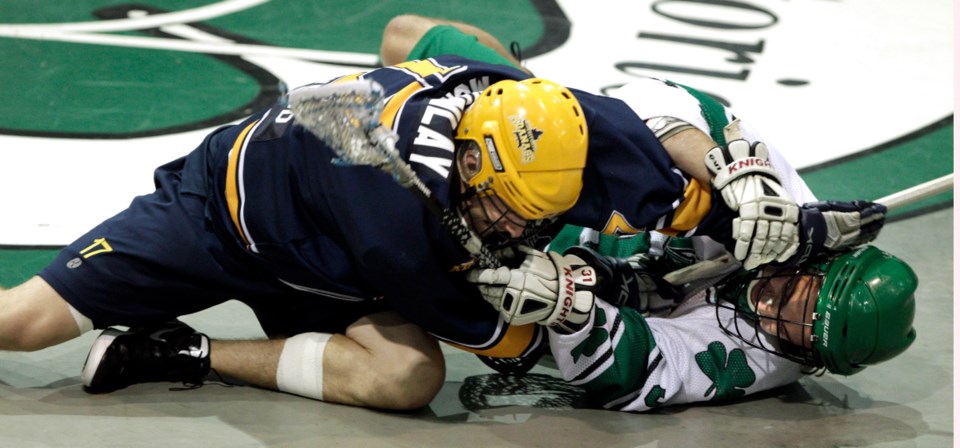The Canadian Lacrosse Association’s decision to implement new rules to help take fighting out of the box lacrosse game has Western Lacrosse Association governors scrambling to see whether they will get in line with the changes.
“The board of governors are meeting [tonight], and we’re going to see what the appropriate action for the WLA is,” said Casey Cook, WLA commissioner. “We want to see what the implications for the league are.
“We feel there is some ambiguity in the rule in terms of what the ramifications are and what the rule itself says. There’s a lack of clarity,” he added. “We need to have that cleared up, and we need to see what the role of the board of governors is in how we’re going to react to that.”
According to the CLA, a task force was established in 2012 to examine fighting and recommendations came back to the CLA board to enforce changes to Rule 45 in the Box Lacrosse Rule and Situation Handbook.
The changes include assessing a major penalty and game misconduct to any player or goalkeeper who fights, with the goaltender’s penalty served by a player on the floor at the time of the infraction.
An instigator or clear aggressor in a fight will also be handed a major and game misconduct, plus any other penalties shall be assessed to the offending player(s).
The new rule states: “Where an instigator or clear aggressor penalty is assessed the non-offending player shall not receive a game misconduct under 45 (a).”
“The CLA board of directors took a stance, and we are positive that others will follow,” CLA president Joey Harris said in a statement.
“The rule change allows our athletes to showcase the sport that we all love and keeps the focus on the aspects that make our sport so great — speed, athleticism and skill. Lacrosse is the quickest game on two feet, played by some of the most passionate and athletic participants in any sport,” he added.
In other words, fighting will no longer be tolerated.
But Cook suggests there is ambiguity in the wording and wants his WLA board of governors to discuss the changes.
“There’s one section where it says one fight and you’re out and there’s the other that talks about the instigator. We know that from the discussion that where there’s an instigator and somebody who has no choice that only the instigator will be removed,” he said.
“There are different types of fights that it necessarily doesn’t address. The staged fight, where you basically get your gladiators ... two players who basically agree to go, like in the first few seconds of a game. There, where you have two willing combatants, are they both instigators?
“Then you have heated battles where two frustrated players get into a scrap. We need to talk about, in the WLA, what rules do we need in, say a 17-10 blowout, where, maybe at the 58-second mark, someone decides, ‘;Heck, I’m going to get kicked out anyway so I’m going to do a number on one of their superstars.’
“We want to make sure it’s treated properly and there are no unintended consequences from the road we go down.”
The WLA is expected to release its decisions, possibly tonight.
The new CLA rules are to be implemented in 2013 and will affect the junior leagues and all levels below.
“My thoughts are I think the intention is good,” said Rod Wood of the Junior Shamrocks. “They’re trying to curb the big line brawls and staged fights, the latter which have become far too frequent.
“Line brawls we don’t get that many of. Unfortunately the one we had last year up in Nanaimo went viral, and I think that’s what brought this issue to a head.”
Wood said fighting has always been a part of the game, just as it has in hockey. What he fears is there will be more stick work in retaliation situations and you might see coaches attempt to use the rule to his advantage to take out better players on opposing teams.
“The positives I see is it will take out the staged fight. We don’t need that or the line brawls or bench-clearing brawls,” said Wood.
The rule could likely affect the role of enforcers and whether those spots will be entirely eliminated by general managers and coaches at the junior and senior levels.



